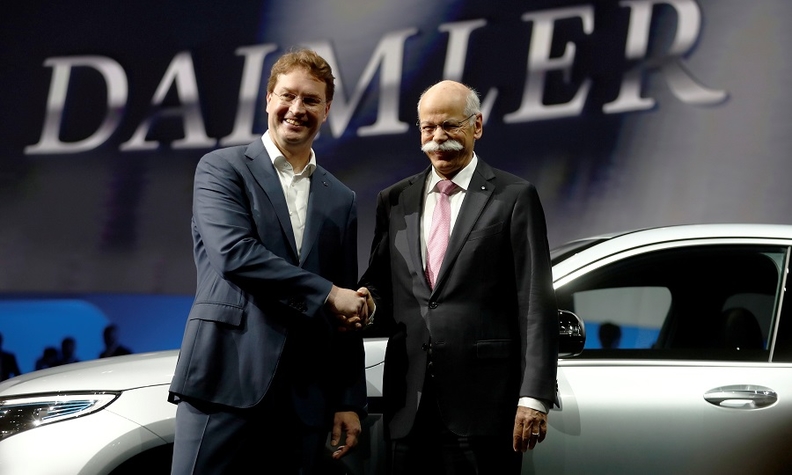FRANKFURT -- Departing Daimler CEO Dieter Zetsche promised cost cuts and an efficiency drive to restore profit margins as the man who steered the Mercedes-Benz automaker for more than a decade leaves his successor to tackle unprecedented industry upheaval.
"We cannot and will not be satisfied with the current level of profitability," Zetsche said Wednesday at the automaker's shareholder meeting in Berlin, which marks the end of his 13-year tenure. "Everything is under scrutiny: fixed and variable costs, material and personnel costs, investment projects, vertical integration and the product range."
Daimler's target remains to return Mercedes-Benz Cars, which includes the Mercedes brand and Smart, and Mercedes-Benz Vans to a "profitability corridor" of 8 percent to 10 percent by 2021, the company said.
At the heavy trucks and bus divisions, the goal is to achieve a sustainable return of 8 percent and to "unlock further potential."
Zetsche, 66, and Chief Financial Officer Bodo Uebber, 59, who is also leaving, turned Daimler from an industrial conglomerate that included holdings in aviation into a company focused on upscale passenger cars and commercial vehicles.
Among their key decisions was selling Chrysler to Cerberus Capital Management in 2007 before the financial crisis pushed the U.S. mass-market manufacturer into bankruptcy.
Following the ill-fated merger with Chrysler, the duo shepherded the painful restructuring of Mercedes after quality woes dented sales. This included axing thousands of jobs, shaking up design and expanding the brand's compact-car offerings, culminating in winning back the global luxury-car crown from BMW in 2016.
Both automakers now face the difficult task of how to allocate shrinking profits and find savings to finance the shift toward electric cars and digital services with a payoff that might be years away.
Zetsche will hand the wheel to Ola Kallenius, 49, when today's gathering concludes. The Swedish-born executive gave a first glimpse on his strategy last week, pledging to make Daimler greener.
Zetsche told reporters this month the onus is on automakers to show they can generate adequate profit margins from electric cars to lift stock valuations, which have been squeezed as investors deem traditional automakers ill-prepared to adopt new technology.
Adding to headwinds are swirling trade woes that threaten vehicle exports and stricter emission limits in key markets. Tighter rules on carbon emissions that take effect in Europe next year mark the biggest hurdle, with many automakers potentially exposed to significant fines.
"I have never seen such a material event risk in my career," Evercore ISI analyst Arndt Ellinghorst said in a note last week.
Daimler is also wrestling with pending probes into its diesel-car emissions and a recall imposed by German authorities. Its U.S. litigation risk related on diesel cars may exceed $4 billion, according to Bloomberg Intelligence estimates.
Daimler generates the vast majority of profits with big SUVs and sedans. It expects more than half of global deliveries to be fully-electric or plug-in hybrid cars in 2030 and plans to make its entire model lineup carbon-neutral by 2039.
Corporate overhaul
Kallenius will also need to turn around sagging profits led by a downturn in the core Mercedes Cars unit, where earnings slumped 37 percent during the first quarter.
Shareholders will vote on the biggest corporate overhaul since the merger with Chrysler that will split the group into three legally separate units comprising cars, trucks and financial services.
The new structure -- which comes with significant costs -- is meant to speed up decision making and allow the individual units to forge collaborations more easily. Investors have criticized the project as not going far enough and argue for a separate listing of the trucks business, similar to Volkswagen Group's plan for Traton.
Daimler is spending 10 billion euros to develop more than 10 full-electric vehicles, including the Smart minicar brand, by 2022 and started selling the Mercedes-Benz EQC this month to challenge Tesla's Model X.
To bring down costs and free up funds for new technology, Zetsche announced "comprehensive" countermeasures three months ago, but has not yet provided details.
In a sign of industry shifts, Daimler recently forged tie-ups with arch rival BMW on mobility services including short-term rentals and ride hailing, as well as autonomous car technology.
Kallenius last week foreshadowed deepening ties with peers, suppliers and technology firms.
His new CFO Harald Wilhelm, who joined from Airbus last month and will officially resume his position after the annual general meeting, has previously been in charge of mergers and acquisitions at the company that was then called DaimlerChrysler Aerospace.

